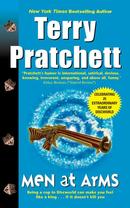
Guards! Guards!
and
Men at Arms
Terry Pratchett
I picked up a few Terry Pratchett books after hearing that he was struggling with terminal illness. RIP.
Pratchett was similar in so many ways to Douglas Adams: Beloved, prolific atheist British authors born around 1950 known for comic fantasy.
Americans may not be as familiar with Pratchett’s Discworld, a series spanning dozens of books, as they are with Hitchhiker’s Guide to the Galaxy. But it is a hugely successful franchise, and Pratchett deserves to be in the conservation with Adams when it comes to comedy writing.
In addition to the obvious demographic similarities between the two writers, they both wrote as if they were failed philosophers or sociologists who turned to satire after giving up on making sense of the world.
Pratchett’s books, like Hitchhiker’s guide, are light reading.
But he slips a number of big ideas into the plot that he obviously stewed over his whole life.
One strain of commentary running throughout his books, and especially Men at Arms, is the idea that the city and the economy are shaped by market forces, class, and tradition in ways that no one person can understand but that somehow work out in the end.
It’s thought express by two characters in particular: The city’s non-king ruler, Havelock Vetinari -- or simply “the patrician,” and Sam Vimes, the down-to-earth, commoner sergeant of the Night Watch who observes the people of the city at the street level.
The Patrician is good at dealing with and manipulating individual people. But actual developments in the city, Ankh-Morpork are beyond his control -- a running theme in the books. Conversely, Vimes is street-smart and and dogged, but he can only respond to problems when the natural state of affairs is disturbed, not shape events.
Both realize that the safety and health of the city, and the direction that society takes, are beyond anyone’s control. The city has a logic of its own. That logic is manifested in guilds that arose over time, such as the Assassin’s Guild, to fulfill needs.
But it goes beyond the economics of the city and the market. Pratchett often includes vignettes or subplots that touch on why rich and poor live alongside each other without revolution, why so many of the city’s poor people have a strong sense of honor even though they have nothing else, and how sketchy, alcoholic, or despised minority people find a way to make their way through the world.
Here’s a small example:
and
Men at Arms
Terry Pratchett
I picked up a few Terry Pratchett books after hearing that he was struggling with terminal illness. RIP.
Pratchett was similar in so many ways to Douglas Adams: Beloved, prolific atheist British authors born around 1950 known for comic fantasy.
Americans may not be as familiar with Pratchett’s Discworld, a series spanning dozens of books, as they are with Hitchhiker’s Guide to the Galaxy. But it is a hugely successful franchise, and Pratchett deserves to be in the conservation with Adams when it comes to comedy writing.
In addition to the obvious demographic similarities between the two writers, they both wrote as if they were failed philosophers or sociologists who turned to satire after giving up on making sense of the world.
Pratchett’s books, like Hitchhiker’s guide, are light reading.
But he slips a number of big ideas into the plot that he obviously stewed over his whole life.
One strain of commentary running throughout his books, and especially Men at Arms, is the idea that the city and the economy are shaped by market forces, class, and tradition in ways that no one person can understand but that somehow work out in the end.
It’s thought express by two characters in particular: The city’s non-king ruler, Havelock Vetinari -- or simply “the patrician,” and Sam Vimes, the down-to-earth, commoner sergeant of the Night Watch who observes the people of the city at the street level.
The Patrician is good at dealing with and manipulating individual people. But actual developments in the city, Ankh-Morpork are beyond his control -- a running theme in the books. Conversely, Vimes is street-smart and and dogged, but he can only respond to problems when the natural state of affairs is disturbed, not shape events.
Both realize that the safety and health of the city, and the direction that society takes, are beyond anyone’s control. The city has a logic of its own. That logic is manifested in guilds that arose over time, such as the Assassin’s Guild, to fulfill needs.
But it goes beyond the economics of the city and the market. Pratchett often includes vignettes or subplots that touch on why rich and poor live alongside each other without revolution, why so many of the city’s poor people have a strong sense of honor even though they have nothing else, and how sketchy, alcoholic, or despised minority people find a way to make their way through the world.
Here’s a small example:
The reason that the rich were so rich, Vimes reasoned, was because they managed to spend less money.
Take boots, for example. He earned thirty-eight dollars a month plus allowances. A really good pair of leather boots cost fifty dollars. But an affordable pair of boots, which were sort of OK for a season or two and then leaked like hell when the cardboard gave out, cost about ten dollars. Those were the kind of boots Vimes always bought, and wore until the soles were so thin that he could tell where he was in Ankh-Morpork on a foggy night by the feel of the cobbles.
But the thing was that good boots lasted for years and years. A man who could afford fifty dollars had a pair of boots that'd still be keeping his feet dry in ten years' time, while the poor man who could only afford cheap boots would have spent a hundred dollars on boots in the same time and would still have wet feet.
This was the Captain Samuel Vimes 'Boots' theory of socioeconomic unfairness.
That is one of the more explicit examples of Vimes playing the role of Pratchett thinking through some big issues. Not didactic or moralistic -- you wouldn't notice it interrupting the plot in context. Like police in real life, Vimes sees all the different areas of the city and all walks of life in a way few others do, and is a great vehicle for such asides.
Pratchett is hilarious light reading, perfect for falling asleep. But sometimes I end up thinking about the stories long after I’ve finished them.
Pratchett is hilarious light reading, perfect for falling asleep. But sometimes I end up thinking about the stories long after I’ve finished them.

